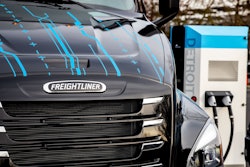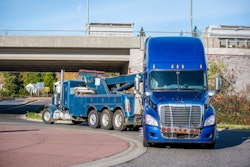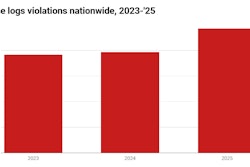Maroon Express Inc., a now-out-of-service carrier that double brokered a load from Uber Freight's network (which ended up behind small fleet Blaga Express' tractor) is part of an investigation at both federal and state levels after a clean inspection report on what's shaping up to be a strange 2024 International truck.
After Overdrive reporting surfaced the double brokering scam and the Uber Freight payment fiasco, Matthew Patrick of the Bannon Report, a freight fraud watchdog, said he'd tangled with the same double broker, and found some troubling information.
[Related: FMCSA forces broker transparency from Uber Freight after double brokering scam]
Patrick maintains a "do not use" list of more than 11,000 motor carrier authorities he has either caught in double brokering scams, or has significant and credible evidence enough to show they're not good-faith actors.
That list featured Maroon, but after the Uber Freight story, Patrick started connecting some dots.
In a LinkedIn post addressed to load board DAT, Patrick's Bannon Report detailed even more bizarre and concerning activity around Maroon.
"Five of your active carrier customers had an inspection under VIN#3HAEUMML2RL571393 within 18 days at same York County, South Carolina, inspection station in August of 2023," wrote Bannon Report. "Three of these inspections occurred within four days of each other, by companies headquartered across the country in different states. This same VIN# was the sole inspection for Maroon Express Inc, occurring in July of 2023."

That's the same Maroon Express that, in concert with a brokerage entity called Delta Dune (whose broker authority has also since been revoked), stiffed Blaga on payment for a load in September, but still got paid by Uber Freight.
A look at the inspections history associated with the truck's VIN number revealed an astounding 15 inspections between July 10, 2023, and Sept. 18, 2023. In August of 2023 alone, according to this rundown on the BrokerSnapshot.com website, the VIN is associated with 10 inspection reports, nine of them in South Carolina.
Furthermore, the VIN corresponds to a medium-duty International MV607, certainly not the right sort of power to pull a 53-foot reefer trailer like the one Blaga used for that Uber Freight load.
In those 15 inspections, the truck was operated by 14 different carriers, all with different DOT number identifiers. Three of the carriers have since been placed out of service, and four have additional inspections within the last 24 months. Of those 14 carriers, at least one, besides Maroon, has been accused of double brokering.
Owner-operator Ulysses Walls, headquartered in Sanford, Florida, and operating as McKinney-Walls LLC, has not one, but two inspections on his company's record in the MV607 in question. When Walls was using it last summer, he'd rented the unit from a South Carolina company to put a driver in. Walls' authority itself has eight inspections on the record in just the last year or so, six of them in South Carolina.
Walls has never personally even seen this particular truck. But he said South Carolina state troopers have given him fits of late -- pulling in a truck for inspection for as minor a reason as having "a little dirt from the back roads" on it, he contended. "It's cost me thousands of dollars" getting inspected so many times, said Walls. "I wish it was scheduled. As someone driving in a box truck and leaving home for days trying to make $1,500 to spend $600 on fuel and bring home $900, inspections hit me hard.
"I’m actually a bit apprehensive -- I won’t say fearful -- about even crossing over into South Carolina anymore."
Walls' company accounts for just two of the 15 inspections of the medium-duty International, though. Its wealth of inspections associated with motor carriers headquartered all around the nation raises questions, considering how many owner-operators and other small carriers have struggled to land freight from brokers simply because they've got the opposite problem -- no inspections on their 24-month record at all.
Ilya Denisenko, the owner-operator behind the Millennial Trucker account on Twitter, knows just how such a scenario feels for the owner on the short end of the stick.
Brokers going all in on inspections, length of authority
In trying to stamp out freight fraud, which grew more than twofold in 2023 according to Truckstop, many brokers big and small have doubled down on old tactics, placing age-of-authority thresholds on the carriers they'll deal with, and often requiring a carrier to have been inspected by law enforcement.
Denisenko has documented the frustrations of a relatively young independent trucking business online, and he says it's only getting worse.
"I'm trying to network with other companies and brokers, but I'm basically reduced to having to work with TQL and C.H. Robinson," he said. "Even some brokers that people say will work with new authorities, that say on their website they work with 60-90 days of authority, are extending it."
According to Denisenko, "Even Amazon is 120 days now. Schneider is 8 months. Pepsi requires a year and an inspection right now."
Inspections are a new type of currency as brokers take broad steps to fight the tricky, shape-shifting problem of double brokering. Denisenko was speaking at the conclusion of the Broker-Carrier Summit event in Kansas City on Wednesday, and said brokers take a newly intense interest in inspections.
"At the Broker-Carrier Summit, I had brokers tell me even if you don’t pass the inspection, just showing the inspection shows you’re a real person, not a double broker or stealing freight," he said. "Even if you fail, it shows you're an actual carrier."
But as Maroon Express's curious inspection report shows, that theory might not hold.
Denisenko got lucky with a clean Level 1 inspection just three days into his authority. Even still, when he calls a broker, all they want to hear is his motor carrier number (MC), and when that MC number shows only about 100 days of authority, the conversation often ends there.
"As soon as I posted about getting inspected on day three, countless drivers messaged me saying they've had their authority for ten years and never got an inspection," he said.
Not only does such a policy hurt legitimate new authorities, he said, it creates a perverse incentive for a secondary market for used, well-worn MC numbers.
"There are ways you can purchase an LLC with an authority, or just start an authority and let it sit, that don’t really add any legitimacy" to a trucking operation, he said. "These ways are cheaper and quicker and easier than actually driving a truck and hauling."
[Related: How owner-ops can avoid, or ace, inspections during Roadcheck]
Patrick concurred. In his research for the Bannon Report, he said he's come across online markets with MC numbers for sale. "We had found an advertisement on Reddit and Facebook saying 'we pay cash for MC numbers, minimum two years authority and in good standing with Amazon, Uber and C.H. Robinson,'" he said. "That just screams fraud."
Denisenko feels penalized for running a legit operation. "It's almost like it would be easier if I was fraudulent. There's plenty of cheap, easy routes" to pick up an older MC number, he said.
Meanwhile, double broker networks strewn across the world are "having a blast" with dozens of MC numbers. According to Patrick, one runs eight offices, has twenty employees, and clears $180,000 a month. "That's a lot of money for some young guy in Romania," he said.
Dale Prax, another freight fraud vigilante, says he's seen similar MC number mills double brokering out of Uzbekistan with likewise similar impunity.
Somehow, legitimate, hardworking trucking operations can't get inspected, but Maroon Express, among others, seems to have cracked the code.
"If [double brokers] have figured out how to get inspections, that's frightening," said Walls.
[Related: The double-brokering slow burn: How it happens, and how to fight back against it]
Have the scammers cracked the code on inspections?
Patrick admittedly put on his "tinfoil hat" for this one, but could some inspector in South Carolina be in on the scam?
Overdrive flagged the inspections anomaly to Federal Motor Carrier Safety Administration and South Carolina authorities, who said they would investigate the situation.
FMCSA spokesperson Cicely Waters said the regulator's legal team was "actively investigating the identified cases, which will help them further assess the overall challenge."
A South Carolina Department of Public Safety spokesperson said the agency was "aware of what’s going on and investigating it," but that they had nothing to release publicly and no timeline for such a release.
For a gut check, Overdrive contacted Jeremy Disbrow, Roadside Inspection Specialist at the Commercial Vehicle Safety Alliance. Disbrow has 25 years of experience in law enforcement, much of that doing roadside inspections. Disbrow wouldn't comment on the double brokering from the Maroon Express carrier authority, given that's far outside CVSA's mission, but otherwise he gave good reasons for Overdrive to put down the tinfoil hat.
"All of those inspections are from different inspectors, and there's also a massive amount of DOT number fraud, for lack of a better word, that all industry members have observed," said Disbrow.
Here's what he means by that: "People are basically running under the radar and don’t have their own DOT number and then writing them down at a truck stop" and hastily applying a paper number to the side of the truck, he said.
Walls, whose company racked up two inspections in the truck, said the driver had indeed applied a paper temporary DOT number to the rental.
With 15 apparent inspections associated with the truck's VIN over just a few months, Disbrow said the volume "certainly does look suspicious," but a paper DOT number will "get you some attention," and your plates run by CMV enforcement. (Need an inspection? Maybe hauling with paper numbers in South Carolina will get you there.)
[Related: Way to avoid trouble at the scale house, with Roadcheck on the horizon]
But rather than a single inspector pulling the same truck over and over, Disbrow attributed the volume of inspections to CMV enforcement being fragmented and limited in scope. "Unfortunately for a roadside inspector, there's not a whole lot they can do other than turn that over to FMCSA to prompt an investigation," he said, when seeing strange inspections anomalies like these.
Disbrow acknowledged that it's tough on carriers who want or need inspections to get business with brokers, but that it's important truck inspectors target likely bad actors and don't spend their time credentialing operators who are doing everything right. "If you have police officers doing truck enforcement," he said, "you want them to use their common sense. There's a limited number of officers out there, and their job is to get the unsafe motor carriers off the road. Their job is not to build someone's safety rating. I worked in a large metro area and there were maybe six of us" doing CMV enforcement there in any form.
Disbrow said DOT number fraud is frequent in human trafficking cases, too, which officers are trained to detect. Perhaps that's what's keeping this truck at the scales. Perhaps the truck displayed Maroon Express's DOT number randomly. Whatever the case, the inspection associated with the authority certainly bolstered the credentials of the carrier/double broker. Time will tell if investigations yield further information.
[Related: Roadcheck-ready resources: 'Ask Me Anything'-style live rap with Jeremy Disbrow coming May 1]











